Why You Should Avoid Sibling Comparisons and What To Do Instead

Before we get into the topic of sibling comparisons, let me give you all some background into my family 😊 My husband and I have 6 BEAUTIFUL and uniquely different children in our blended family. Our children’s ages range from 5 to 20 years old. 4 boys and 2 girls.
You can learn more about our quirky family here 🤗
Fun facts: two of our children are 12 years old and two of them are 20 years old. And no, they aren’t twins! It’s just how blended families can work sometimes! 🙂
Since we are raising multiple kids in a large blended family, we have this unique situation of having children going through the same milestones at the same time. A lot of times, these dynamics can make it extremely difficult to avoid comparing their behaviors.
It’s common for parents to compare their children overall, but we need to understand the power and potential negative effects of comparing our children to one another.
One study, Parents’ Social Comparisons of Siblings and Youth Problem Behavior: A Moderated Mediation Model, that was conducted annually over the period of 3 years with parents and their children, found that “Parents’ beliefs that one child was better behaved predicted differences in siblings’ reports of parent-child conflict.” Furthermore, the negative effects of comparing sibling became more significant when siblings were close in age.
I want to be completely transparent and share that I still STRUGGLE with not falling into the SIBLING COMPARISON trap…ugh. Let’s be real: It’s hard to completely avoid it. I’m happy to report though, that I am making progress!
I’ve been learning to take on a different view on how I approach my children’s differences. Now I know what to do instead of comparing my children to one another.
I’m excited to share with you all what I have learned and how I am changing as a parent, in regards to allowing my children to be themselves without so much comparison.
[ez-toc]
Sibling Comparisons Are Pretty Common (And Natural!)
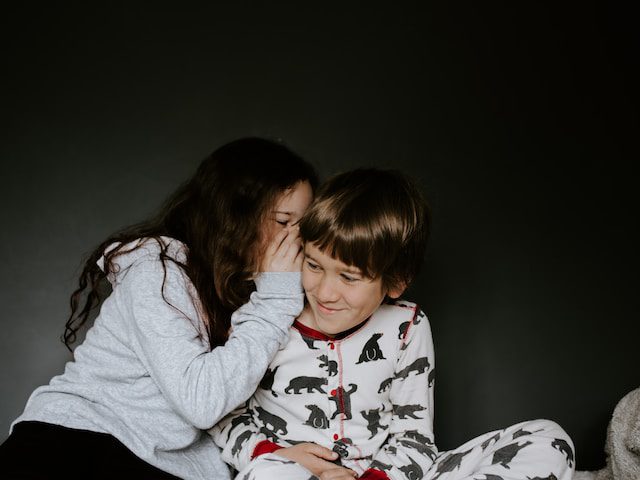
Honestly, comparison is a natural behavior of humans.
Comparison hasn’t always been a bad thing. Early mankind needed to use our ability to compare in order to best utilize each person’s strengths, such as who is better at hunting vs fishing, vs building….you get the idea.
As parents we often compare our parenting skills to other parents. We compare our careers or our skills to those of our colleagues. We look at the milestones that our friend’s kids reach, and question why our kid didn’t get to that milestone yet. The comparison trap can get to us in basically every area of our lives.
Something interesting happens though, when we are raising siblings. Comparing siblings can impact children on a deeper level than we even realize.
Overall, we have good intentions when we compare siblings. Often, we figure that by comparing our kids we’ll motivate them to take action, improve a behavior, or that it will decrease an undesired behavior. Unfortunately, sibling comparison can usually have the opposite effects from what we had hoped for.
“Don’t compare your child to others. There’s no comparison between the sun and the moon. They shine when it’s their time.”
-Author Unknown
Let’s Talk About How Comparison Effects Siblings
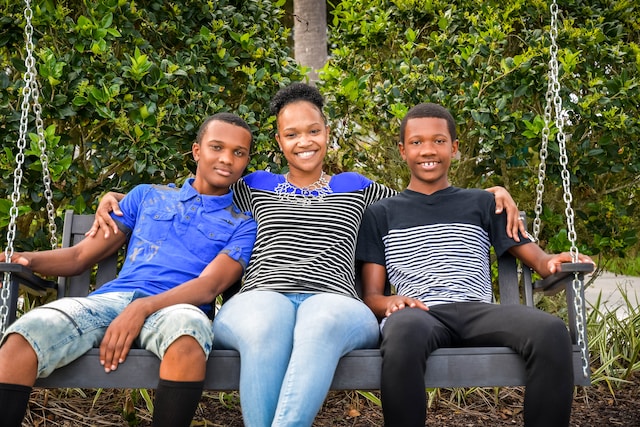
Negative Impact on Self-Esteem
Okay, so what is self-esteem? We all get the overall concept of self-esteem but do we truly understand what it is exactly?
Oxford Languages defines self-esteem as, “confidence in one’s own worth or abilities; self-respect.” Children are forming their perception of their own worth. A major factor in how they perceive their strengths and abilities, is through their childhood interactions with their parents and siblings.
Kids may act like they don’t care about what we think, but honestly it’s just an act. Our words matter to them. A LOT. When siblings are constantly bombarded with comparisons from their parents, it truly shapes their perception of themselves.
Kids internalize our words. Children take what we say and use it to develop their view of themselves. When they are being compared to their sibling, the untold message that they are receiving is that they are lacking in some way.
Today’s world is already harsh enough on our kids, so let’s try our best to counter that by uplifting and encouraging our little humans whenever we can 🙂
Comparisons Between Siblings Creates Insecurities
Imagine that you had a boss, who always compared you to your co-worker, every single day. Imagine that despite putting in lots of effort anytime you made a mistake, your co-worker was used as a reference point for the type of worker you should be. I don’t know about you, but I know I would be pissed off.
Insecurities can be built when a child perceives that his/her efforts are not acknowledged. Whether it’s intentional or not, sibling comparisons can lead children to question their abilities, strengths or skills. Kids may grow up feeling uncertain about themselves when their accomplishments become more recognized than their efforts, especially when compared to that of their siblings.
Fosters Sibling Tension/Animosity
Okay, so do you want to know the easiest ways to get siblings to hate another? It’s constant comparisons.
Constant sibling comparisons can plant seeds of jealousy and resentment between siblings. It’s hard to like your older brother or sister, when you are repeatedly told that you’re not behaving as well as them.
Some mild comparisons are fine but as Dr. Sally-Anne McCormack explains in this Moms article, Why Comparing Kids Damages Their Bond With Their Sibling, “when the comparison starts to become laden with judgments and evaluations that make kids feel superior or inferior to their sibling, we start to get into dangerous territory.“
I now have a better understanding of how sibling comparisons can inadvertently plant seeds of resentment between my kids. So when I see my kids bickering, I try to think back on whether my words towards them that day fostered building a connection or increased tension between my kids. Sibling rivalry is already hard to avoid, so why not give them a step up by limiting the comparisons when we can.
Comparison Also Effects Your Connection With Your Kids
Yes, comparing your kids to one another, will effect how connected your kids feel to you! When you add up all of effects of sibling comparison that is listed above, it’s not surprising to hear this.
Sibling comparison can breed resentment towards parents also. As our children get older and develop their identities, resentment may build towards parents because of their experiences with sibling comparisons. Furthermore, this ongoing childhood experience can lead to more rebellious behaviors from your child.
Unfortunately, the more we label a child as having behavioral issues or academic struggles compared to their sibling, the more it will shape how we perceive their actions. As parents we have to address issues as they come up, but we also need to be careful to not look at every behavior from a deficit model. Our kids deserve some grace…just like we all do ❤️
Here’s What To Do Instead of Comparing Your Kids
(Don’t Worry, There’s Still Hope!)
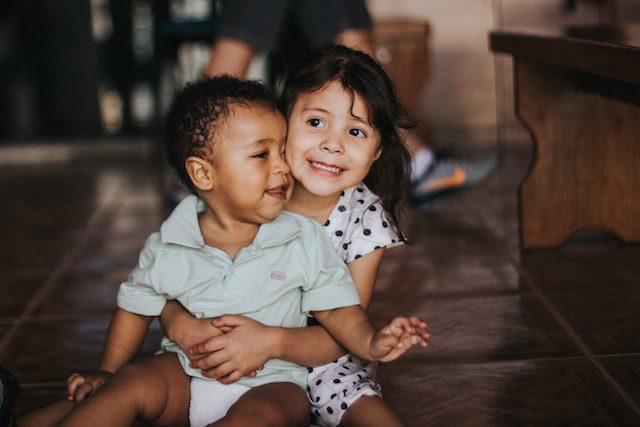
Listen mommas, despite how this all sounds, there is still hope! Here are some strategies that I have incorporated, and guess what? They’re working!
Every child is unique, every home is different, and nothing works all the time, BUT we can still be proactive in how we choose to shine light on our kids. Here are some parenting strategies that you can start incorporating today to counter the comparison trap:
Time for a Self Check-In
I don’t know about you but I tend to make more parenting mistakes when I am overwhelmed and burned out. All it takes is a couple of night of little sleep, a week full of appointments/obligations, or a just a day of my kids pushing the limits (a.k.a. misbehaving) for me to loose patience with my kids. This can in turn lead to me falling into the comparison trap…ugh.
I have learned that being preventative versus reactive is the best approach to take when deciding on parenting strategies. In my post on mom burnout, I share the effects of feeling overwhelmed as a mom and how you can tackle burnout head on.
If you want to decrease the chances of falling into the sibling comparison trap, then prioritize making sure that your not running on empty. Honestly, self-care should be the foundation to all parenting approaches. You can’t effectively take care of the your little troop, if you’re ready to fall apart yourself.
Take care of yourself and make time for self-care whenever possible, which will in turn increase your chances of effectively tackling the ups and downs of mom-life!
Take Accountability

It is near impossible to completely avoid comparing your kids. All we can do is try our best. But when we find ourselves caught up in the comparison trap with our children, the best thing to do is take accountability.
Let your kids know that you misspoke, that you want to do better, and remind them of their individual strengths and abilities. Tell your children and show your children that you are proud of them.
You are more likely to develop a closer relationship with your children, when you take accountability for your mistakes. You will model for them how to learn and grow from their own mistakes. So take accountability and own up to it when you do find yourself comparing your kids to one another, then follow up with intentionally making changes in your parenting approach.
Let Each Kid’s Action Stand On It’s Own
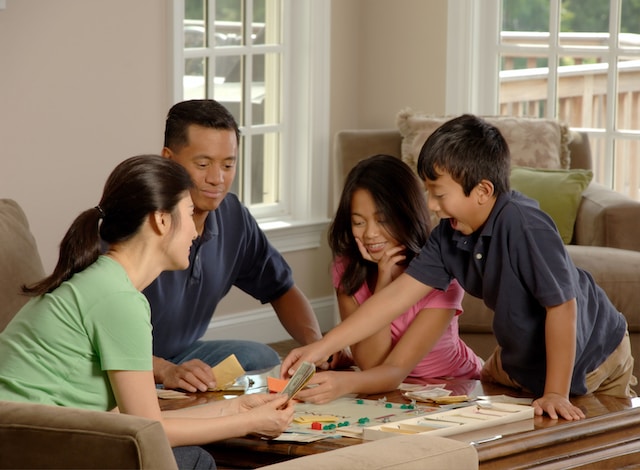
Every single one us deserve for our actions to stand on its own merit. Our children deserve the same grace.
If your child misbehaves, address that behavior without bringing up a comparison about how their siblings wouldn’t act that way. When your child gets a good grade on a school assignment, give them praise without bringing up their siblings accomplishments at the same time,
There will be times when all of your children’s behaviors will need to be addressed together, but the more you acknowledge each child for their own attributes, the more positive benefits your entire family will reap.
Offer Each Child Praise Without Bringing Up Their Siblings

This was very hard for me. Again I’m still struggling with it but I’m on the path to comparison recovery!
It may seem like it’s motivating to a child to say, ” Your brother does really great with putting away his clothes. You’re doing great, but maybe try to be more organized like he is.” (I know, I know. Crappy example, but I think you get the point lol) In reality though what that child hears is, ” I tried but it wasn’t good enough. My brother always does better than me.”
Instead, try keeping it simple. It means a lot more to kids to hear, ” You did great!” Follow this up with a genuine smile and a hug, and the message of “I am loved and appreciated,” gets conveyed a lot more effectively.
Try not to overthink it. That was definitely my downfall at times. I was always more focused on motivating my kids to “do the right thing,” then on fostering the motivation to want to do the right thig on their own.
Believe me, your general message will stick more, if your kids feel self-motivated, seen and loved.
Be A Cheerleader for Each Child!

Comparing our kids doesn’t mean that we’re bad parents; it just means that we’re human.
Sometimes, comparison can actually be used to help motivate our children. The key is to avoid directly referencing the “better” behavior of the other sibling, and instead encourage and promote positive behaviors. Make it a point to intentionally identify each child’s positive skills and show your kids that you love each of them just as they are.
Cheer on your child for their own accomplishments so that they can recognize how great they are! Show them that they efforts and intentions are appreciated and valued.
Offer genuine praise when the opportunity comes up. All our kids need is to feel that our love for them, is unconditional. The more we highlight their beautiful God-given attributes, the more they will feel good about themselves. They may even hate their sibling a little less lol.
Talk Less & Keep It Simple!
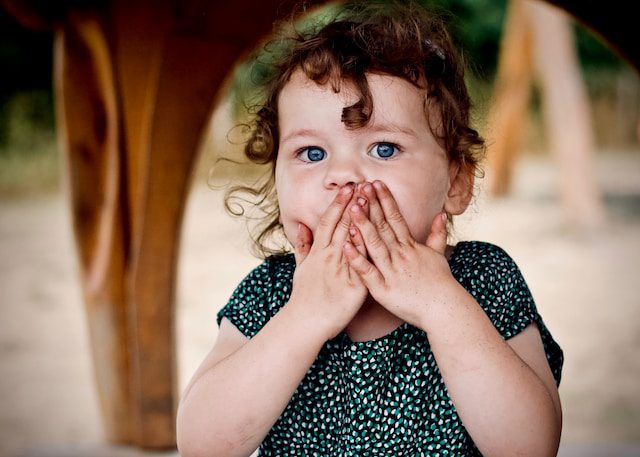
I touched on this tip a bit in the previous section, but I have found that this simple strategy of keeping it simple is highly underrated.
Ok, let’s be real about something. Whether we like it or not, the more we talk the less our children listen. We tend to lecture because we want our message to be heard. Our intentions are generally good, but when we lecture too much, we are actually working against our goal.
In Psychology Today’s article, psychologist Eileen Kennedy-Moore, Ph.D. explains how “research on parenting shows that lecturing, nagging, scolding, and talking at children or teens don’t inspire cooperation.”
Yikes!
So, you may be wondering why I’m bringing up lecturing in this article about comparing siblings. Well, it’s simply because when we lecture we tend to feel more inclined to compare our children.
Sometimes we can get ourselves into trouble by lecturing our children too much. I’ve definitely had times when I regretted some of the things I’ve said to my kids when I’ve gone off on a lecturing rant.
Keep things simple, when appropriate. Then try communicating more through your actions, by using the strategies listed above!
Overall, you decide on your parenting approach, but always lead with love, compassion and grace.
Have you struggled with the sibling comparison trap? Share your strategies for tackling this issue in the comments section below.
Take care!
~Val
Dear children, let us not love with words or speech but with actions and in truth.
John 3:18, NIV





3 Comments
Kerry
This is so great! I don’t even have more than one child and I learned a lot! What I love is how extremely thorough this is and the action plan is so detailed. I definitely can compare my child to other kids as well so this was a great reminder.
gary hutchinson
Great article! I really enjoyed reading it. I’m a dad who is guilty of comparing my two sons. My older son’s teacher emailed me a video on why I shouldn’t compare the two. Since then, I’ve been spending more time researching the negative implications it might have on them and trying hard to be more mindful of my behavior. This article has been helpful!
Val @ La Vie In Progress
Thanks Gary! So happy that you found this article and that it washelpful for you!